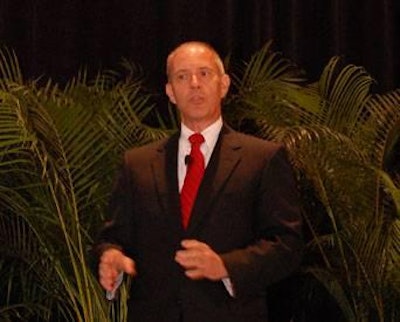
David W. K. Acheson, M.D., partner and managing director, Leavitt Partners LLC, and former chief medical officer, U.S. Food and Drug Administration Center for Food Safety and Applied nutrition, posed several questions for the audience at the opening session of the International Association of Food Protection regarding the future of food safety. "Will brand protection be the primary driver in the future? Or will regulatory compliance if the regulators become more powerful and more prescriptive?" Acheson asked. His message for all stakeholders is "We need to move to a point where planning leads to change, not [foodborne illness] disasters."
Food producers need to plan for food safety and not let foodborne illness outbreaks determine new procedures and regulations, because there is a significant risk that a company will not survive a food safety problem.
Acheson cited the lean finely-textured beef situation to illustrate that a company can go out of business if consumers decide that they just don't like your process, even if there is no food safety risk. He said that food companies need to enhance their food safety culture and understand where the risks are and work to mitigate them. He cautioned food producers not to let regulatory compliance be the driver of their food safety program. Companies must focus on supply chain risk; verify what your suppliers send you. He said it is important to embrace new technology to find new solutions and to remember that as a food producer, you are never done; continuous improvement is essential.
Acheson asked regulators to reward good food industry behavior and to focus on a harmonized regulatory system. Local, state and federal agencies need to work together. He challenged regulators to "stop internal competitiveness" and to "listen to the industry and leverage the knowledge" that the industry has from its testing programs.
Congress needs to learn about the food industry, according to Acheson. He also said that Congress needs to "take the politics out" of food safety. He called on Congress to create a single food safety agency.
Consumers play a vital role in food safety, and Acheson had "take-home messages" for consumers as well. He said that consumers want food with zero risk, but they have to accept that there is always some risk.
"Consumers need to take responsibility for things they can control, be open minded about technology, and be a positive influence on good practices through buying habits," he said. There is a very vocal minority of consumers, approximately 5 to 10 percent, who are driving change in food safety, according to Acheson.
Finally, Acheson called on all stakeholders to accept that we will always have risk in food and to develop a culture of reward based on continuous improvement focus on technology to save cost and reduce risk.


















